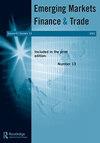资金流动、股票市场和经济政策的不确定性:从一个果子狸国家的视角
IF 3.1
3区 经济学
Q2 BUSINESS
引用次数: 0
摘要
摘要本文研究哥伦比亚经济政策不确定性(EPU)、股票型资金流动(EFF)与股市之间的关系。结果表明,国内、全球和区域epu对哥伦比亚股票收益和EFF产生不利影响。全球和区域EPU向哥伦比亚EPU传输,这使得市场容易受到不确定性冲击。全球EPU冲击导致下个月收益下降2.2%,哥伦比亚EPU上升12%,EFF下降0.24%。此外,较高的EPU增加了流动性,降低了股票回报。我们的研究结果表明,不确定性冲击增加了交易,加剧了国内不确定性,并降低了股价,这是一个反馈循环。关键词:资本流动基金流动溢出不确定性jel: F21F39G11致谢我们要感谢来自Sparkasse OÖ Kapitalanlagegesellschaft m.b.H.的Sebastian Mertl帮助我们获取数据。Joseph J. French要承认,这项研究(部分)是在美国教育部通过科罗拉多大学丹佛分校和杨百翰大学国际商业教育与研究中心的资助下进行的。这项研究并不一定代表美国教育部的政策。披露声明作者未报告潜在的利益冲突。我们没有发现墨西哥EPU对哥伦比亚EFF的显著影响。有关详细的文献综述,请参见Al-Thaqeb和Algharabali (Citation2019)。我们注意到EFF方程中资本控制dummy的系数如预期的那样为负。结果可应要求提供。数据基于报告基金的大量样本。超过18,000只报告股票型基金覆盖了全球投资基金行业管理资产的约96%(截至2019年9月,Informa Financial Intelligence Citation2020a)。结果可应要求提供。格兰杰因果检验也执行流动性的替代措施,即体积。结果与MVTN类似,可根据要求提供。我们使用购买力平价加权的GEPU。结果与当前的权重非常相似,并可根据要求提供。使用标准VAR方法对所有模型进行重新估计,结果与使用贝叶斯推理方法相似。这些结果可应要求提供。本文章由计算机程序翻译,如有差异,请以英文原文为准。
Fund Flows, Stock Markets, and Economic Policy Uncertainty: From the Perspective a CIVET Nation
ABSTRACTWe investigate the relationships among economic policy uncertainty (EPU), equity fund flows (EFF), and the Colombian stock market. Results show adverse impacts of domestic, global, and regional EPUs on Colombia’s stock returns and EFF. Global and regional EPUs transmit to Colombian EPU which makes the market vulnerable to uncertainty shocks. A global EPU shock reduces returns by 2.2% the following month, raises Colombian EPU by 12%, and reduces EFF by 0.24%. Furthermore, heightened EPU increases liquidity and reduces stock returns. Our results suggest a feedback loop where uncertainty shocks increase trading, fuel domestic uncertainty, and reduce equity prices.KEYWORDS: Capital flowsEPUfund flowsspilloversuncertaintyJEL: F21F39G11 AcknowledgmentsWe want to thank Sebastian Mertl from Sparkasse OÖ Kapitalanlagegesellschaft m.b.H. for help with obtaining data. Joseph J. French would like to acknowledge that this research was developed (in part) under grants from the U.S. Department of Education through its Centers for International Business Education and Research at University of Colorado Denver and Brigham Young University. This research does not necessarily represent the policies of the U.S. Department of Education.Disclosure statementNo potential conflict of interest was reported by the author(s).Notes1. We fail to find a significant effect of Mexican EPU on EFF in Colombia.2. For a detailed literature review, please see Al-Thaqeb and Algharabali (Citation2019).3. We note that the coefficient for the capital control dummy in the EFF equation is negative as expected. Results are available on request.4. Data are based on a large sample of reporting funds. More than 18,000 reporting equity funds cover around 96% of the assets under management of the global investment fund industry (as of September 2019, Informa Financial Intelligence Citation2020a).5. The results are available on request.6. Granger causality tests are also performed for an alternative measure of liquidity, namely volume. The results are like those for MVTN and are available on request.7. We use a GEPU with purchase power parity weightings. The results are very similar with current weights and are available on request.8. All models were re-estimated using standard VAR methods and results were like those using Bayesian inference methods. These results are available upon request.
求助全文
通过发布文献求助,成功后即可免费获取论文全文。
去求助
来源期刊

Emerging Markets Finance and Trade
Multiple-
CiteScore
7.80
自引率
10.00%
发文量
182
期刊介绍:
Emerging Markets Finance and Trade publishes research papers on financial and economic aspects of emerging economies. The journal features contributions that are policy oriented and interdisciplinary, employing sound econometric methods, using macro, micro, financial, institutional, and political economy data. Geographical coverage includes emerging market economies of Europe, the Balkans, the Middle East, Asia, Africa, and Latin America. Additionally, the journal will publish thematic issues and occasional special issues featuring selected research papers from major conferences worldwide.
 求助内容:
求助内容: 应助结果提醒方式:
应助结果提醒方式:


